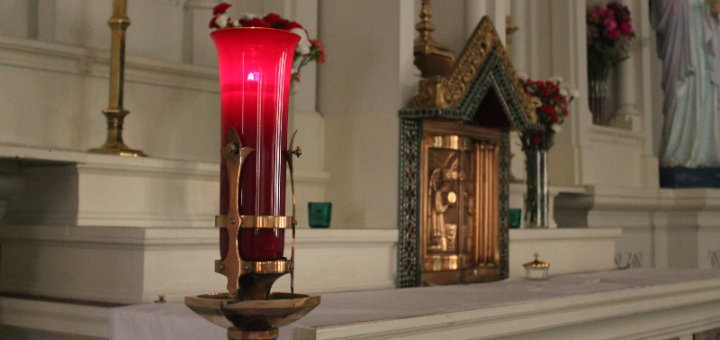
 Copyright 2019 Amanda Villagomez. All rights reserved.[/caption]
Copyright 2019 Amanda Villagomez. All rights reserved.[/caption]
Then many of his disciples who were listening said, “This saying is hard; who can accept it?” ... As a result of this, many of his disciples returned to their former way of life and no longer accompanied him. Jesus then said to the Twelve, “Do you also want to leave?” Simon Peter answered him, “Master, to whom shall we go? You have the words of eternal life. We have come to believe and are convinced that you are the Holy One of God.” (John 6:60, 66-69)In our lives there will be different hard teachings or points of tension -- those teachings that are counter-cultural, those teachings that prompt many to leave or pick and choose. Observing interactions and the rhetoric around present-day hard teachings has me concerned that space for the construction of knowledge that influence beliefs is often lacking in our cultural landscape. In its place, all to often, there is the sentiment of an artificial you must believe this and you must reject this immediately with a layer of shame if you are not in alignment. The problem is, as Jesus modeled, beliefs are a choice -- a response to an invitation, and as Peter conveyed, there is a process to believing. Within this reality, the space created and the methods used to share our beliefs, teach about our beliefs, or to attempt to persuade others about our beliefs matter. All of this has a converse impact on nurturing an environment conducive to learning more about our own beliefs as well. When it comes to hard teachings, one of the challenges of parenting is that we are sometimes trying to better understand points of tension between secular trends in thought and Church teachings for ourselves, while also trying to respond to questions our children pose. Reflecting on our cultural context in points of tension has helped me to consider how to better navigate the terrain, which in turn helps me to consider how to better support my girls in doing the same. The following are aspects that I want to keep in mind:
- Be humble in the face of discomfort. Fr. Mike Schmitz recently created a video that gave background on how currently there are more tensions than before with regards to culture and Catholic beliefs. One of his recommendations is that we “have to acknowledge and accept the painful reality that we are divided.” We have to recognize that it is not easy or comfortable to be in scenarios where we do not feel like we fit in or where we feel misunderstood and judged based on the assumptions of others. In these moments, to aid us through the challenge, we can pray lines from the Litany of Humility, such as “From the desire of being understood, deliver me, O Lord,” “From the fear of suffering rebukes, deliver me, O Lord,” “From the fear of being ridiculed, deliver me, O Lord” (p. 18 in The Power of Silence).
- Lean into the confusion and embrace the process. Alongside discomfort based on differences, sometimes the stance of the culture seems to make sense and can prompt confusion about why the Church has the stance that it does. I recommend to my girls that when they recognize this occurring, they approach it from a stance of humility by recognizing that rather than accepting cultural teachings at face value, they should instead leave space for inquiry to discover more deeply what the Church teaches and why. For each cultural teaching that is out of alignment with Church teachings, there is a counterpoint explanation of why. A desire to learn requires humility, a recognition that maybe the years of wisdom of the Church has something to offer and that we do not yet have all the answers based on what our culture provides. This is an on-going process that requires time and prayer. The harder the teaching, the greater likelihood that there will be back and forth tensions to better understand the Church’s beliefs in light of the mainstream cultural perspective. Becoming comfortable with discomfort allows space to engage in this inquiry of seeking knowledge.
- Leave space to ponder reactions. When engaging in challenging dialogues, it is beneficial to recognize our initial reaction to scenarios that arise but then pause to unpack the different thoughts and emotions that underlie the response. For example, recently I recognized sorrow related to a few different scenarios on social media. Rather than respond, I left space to consider why and realized the initial response was as Fr. Mike describes, recognition that division hurts. Yet it was also based on the manner in which beliefs were shared and that the behavior was being celebrated. As parents, it is important for us to talk about persuasive devices employed and to make choices about which content we consume and affirm with this in mind. Regardless of the side we are on or the issue, we can observe approaches utilized and then use them as points of discussion with our children. Rather than simply cheering in agreement or dismissing in disagreement, we can reflect on whether the tactics model virtues we aspire to embody or whether they contribute to dehumanizing, dividing, or stereotyping. This can help us to then grow in processing the ideas of others, as well as how we craft our own.
- Agreement does not automatically equate love. Some hard teachings result in assumptions made about people who hold the beliefs, often based on incomplete or incorrect understanding of beliefs. One of the most hurtful assumptions can be that beliefs are not rooted in love. Over time, I talk to my girls about how Catholic teachings are based on love, defined as willing the greatest good of the other, and the dignity of life. It is important to come to understand that agreeing or disagreeing with someone does not equate to whether or not you love someone. Jesus provides many examples of great love without agreeing that actions are morally correct. He invites people to healing and joy, allowing space for free will and a process of growth in response. Regardless of decisions, people are assured of His unconditional love. Lectio divina with passages such as the interactions with the woman at the well (John 4:4-26) and the woman caught in adultery (John 8:1-11) provide examples that love does not have to equal agreeing with decisions.
Copyright 2019 Amanda Villagómez
About the Author

Amanda Villagómez
Amanda Villagómez is a wife, mom of 6, and teacher educator. On her personal site, she focuses on the beauty of becoming who God created us to be by celebrating the process of change and growth.


.png?width=1806&height=731&name=CatholicMom_hcfm_logo1_pos_871c_2728c%20(002).png)
Comments